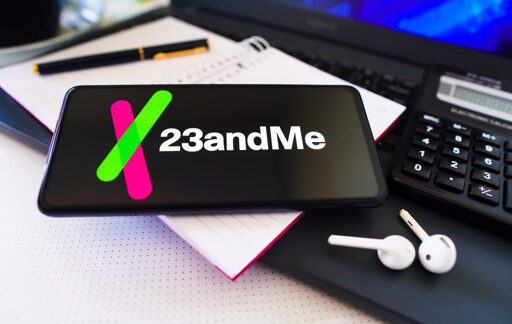Founder of 23andMe buys back company out of bankruptcy auction
-
This post did not contain any content.
Debts are gone AND now he can sell the user data with impunity! No NO, that was that OTHER GUY
-
I thought they had already agreed the sale of the genetic data to another company?
There's an article in the link.
-
I get the sentiment and I'm all for workers sharing in profits, but what do they really risk by working at a company? Sure, the company can fail and they might be stuck in a bad situation, but shareholders and owners probably have it worse in that scenario, right?
Depends, are you considering the fact that 90% of stocks are owned by the top 10% of Americans? Also are you considering that being in the top 10% means you likely have rich friends and family that could bail you out? I think black rock is going to be fine.
Most businesses aren't like my friends parents little Chinese restraunt.
To me using the, "think of the shareholders" line is silly for a reason. The biggest privilege is the privilege to make mistakes without becoming impoverished. Workers have it much harder in that respect.
Edit: grammer
-
I get the sentiment and I'm all for workers sharing in profits, but what do they really risk by working at a company? Sure, the company can fail and they might be stuck in a bad situation, but shareholders and owners probably have it worse in that scenario, right?
Remind me, who is it that gets laid off first when the line starts going down…
-
This post did not contain any content.
This roller coaster keeps on rollering
-
This post did not contain any content.
Ok so I think I'm the first person in the comments to actually click to read the article, cause I'm gonna say something I'm not seeing.
How did you get it to auto snap to the article comment section?
Didnt realize you could share that and it wouldn't default to the article. -
OP, you linked to the comments instead of the top of the article.

Ah dang you did point it out. They even just copied the top comment there, unless they are ColdWetDog.
-
Ok so I think I'm the first person in the comments to actually click to read the article, cause I'm gonna say something I'm not seeing.
How did you get it to auto snap to the article comment section?
Didnt realize you could share that and it wouldn't default to the article.The "#comment" at the end of the URL. It's a title/heading/fragment in HTML that hints to your browser to go there directly.
Like this: https://en.wikipedia.org/wiki/URL#fragment
-
The "#comment" at the end of the URL. It's a title/heading/fragment in HTML that hints to your browser to go there directly.
Like this: https://en.wikipedia.org/wiki/URL#fragment
Oh. Neat.
Thanks for the Wikipedia link
-
This post did not contain any content.
How about the data they sold
-
Ok so I think I'm the first person in the comments to actually click to read the article, cause I'm gonna say something I'm not seeing.
How did you get it to auto snap to the article comment section?
Didnt realize you could share that and it wouldn't default to the article.I've no idea to be honest.
-
I get the sentiment and I'm all for workers sharing in profits, but what do they really risk by working at a company? Sure, the company can fail and they might be stuck in a bad situation, but shareholders and owners probably have it worse in that scenario, right?
Workers give their entire lives.
-
Workers give their entire lives.
They don't lose their life if a company goes under though? I don't mean to diminish the contribution of workers. I think they need a much higher share of what companies take in, and they need more voices at their companies.
-
Depends, are you considering the fact that 90% of stocks are owned by the top 10% of Americans? Also are you considering that being in the top 10% means you likely have rich friends and family that could bail you out? I think black rock is going to be fine.
Most businesses aren't like my friends parents little Chinese restraunt.
To me using the, "think of the shareholders" line is silly for a reason. The biggest privilege is the privilege to make mistakes without becoming impoverished. Workers have it much harder in that respect.
Edit: grammer
You make a good point that the shareholder/business owner class is more likely to have better safety nets. So from that standpoint, if the absolute value of their loss is greater, it could have a much less significant impact on their lives.
I think you may be underestimating the amount of small businesses though, at least in the US.
-
Ok so I think I'm the first person in the comments to actually click to read the article, cause I'm gonna say something I'm not seeing.
How did you get it to auto snap to the article comment section?
Didnt realize you could share that and it wouldn't default to the article.Everything after the # character in the URL is called an anchor and it's not actually being sent to the website server so it's meant for your browser (though the server can see it using javascript). The anchor can point to any ID in the HTML of the web page and browser will scroll it into view on page load. You can find the ID of any element using right click -> inspect though not all elements have explicit ids.
-
Debts are gone AND now he can sell the user data with impunity! No NO, that was that OTHER GUY
Hey, don't talk about Guy Incognito like that
-
They don't lose their life if a company goes under though? I don't mean to diminish the contribution of workers. I think they need a much higher share of what companies take in, and they need more voices at their companies.
No, they do. They don't die, but they lose their current life
-
I get the sentiment and I'm all for workers sharing in profits, but what do they really risk by working at a company? Sure, the company can fail and they might be stuck in a bad situation, but shareholders and owners probably have it worse in that scenario, right?
Workers risk a few things, depending on the job:
- Health
- Time
- Opportunity (could be working someplace else that's better)
These have a lot of dimension to them, including how one quantifies what "pay" actually is/for, what legal restrictions there are around taking the job (e.g. non-compete, non-arbitration), work/life balance, and so on.
Risk comes into play where the employee takes a bet that the job won't destroy their health, work only as much as is absolutely necessary, and have taken a position at the optimal balance of responsibility, personal growth, retirement prospects, and income. It's a risk since there are substantial barriers to changing to a new job, so you can wind up "stuck" in a bad position, but can't know until after you start.
-
In the capitalist system, the investors deserve all the profits because they're the ones risking everything, or something like this, I'm not an economists.
Bondholders are having a haircut.
-
This post did not contain any content.
TTAM later said it had obtained backing from a “Fortune 500 company with a current market capitalization of more than $400 billion and $17 billion of cash on hand.”
That's not at all concerning.







